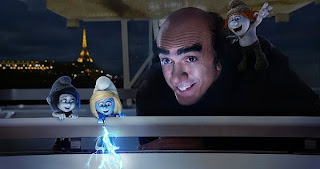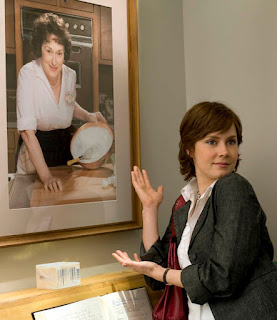 I intern your milkshake
I intern your milkshake
Grade: B
Director: Quentin Tarantino
Starring: Brad Pitt, Mélanie Laurent, Christoph Waltz, Eli Roth, Diane Kruger, and Daniel Brühl
MPAA Rating: R
Running Time: 2 hours, 32 minutes
To proclaim Inglourious Basterds is Quentin Tarantino’s fourth-best film (ahead of only the indulgent, indolent Death Proof) is not an insult, as each entry in this top quartet exceeds the finest production most directors will ever generate.
Still, the film’s relatively relegated status is interesting since Tarantino’s long-rumored World War II flick has been a pet project dating back to his immediate post-Pulp Fiction years. Like all Tarantino movies, Basterds is largely homage, principally – says the director – as a “spaghetti western but with World War II iconography.” There are also overt allusions to so-called “macaroni combat” flicks – the Italian exploitation war movies of the 1960s, 70s and 80s – as well as French New Wave cinema.
Of course, there is also Tarantino’s distinctive pulpy, madcap mayhem buttressed by an underlying, underrated maturity. Few filmmakers are afforded the latitude Tarantino enjoys to methodically develop scenes and storylines. This freedom sometimes leads to sequences that are rudderless, drifting on with no discernible payoff. However, it also produces gems like the opening, 20-minute long “Chapter One” of Basterds. Armed only with guile and a glass of milk, SS Col. Hans Landa, played sensationally by Austrian actor Christoph Waltz in an Oscar-caliber performance, interrogates a French dairy farmer suspected of harboring Jews. The scene reinforces Tarantino’s affinity for Sergio Leone, and it also crackles with QT’s trademark visual and dialogue flourishes. Unlike most filmmakers, the excitement and tension in a Tarantino film largely derives from the fact that you never know how any particular scene will end, and Basterds is no exception.
After the opening act, we are then introduced to the key players for the rest of the interwoven storyline. First is Lt. Aldo Raine (Brad Pitt), a thickly accented Tennessee hillbilly leading a motley crew of eight Jewish American soldiers nicknamed the “Basterds,” whose mission is to comp the European countryside looking to kill and scalp “Nat-zzies.” Later, we meet a Jewish woman going by the name of Emmanuelle Mimieux (Mélanie Laurent), the proprietress of a Parisian cinema that is forced to play German films by Leni Riefenstahl and G.W. Pabst. (In one of the film’s more memorable lines, Mimieux explains that she displays the names of filmmakers on the theater’s marquee because “In France, we revere our directors.”)
In typical Tarantino fashion, these diffuse plotlines gradually intersect around a blazing, bombastic finale set around the premiere of the latest Nazi propaganda film by Joseph Goebbels (Sylvester Groth), called A Nation’s Pride, which dramatizes on the heroic exploits of a German soldier (Daniel Brühl) who also harbors affections for Mimieux. QT’s love of cinema is the principal sidelight in Bastards, with characters who provide a virtual audio tour through early 20th century Weimar cinema.
As in his previous works, Tarantino wrings tension out of the clash of characters with varying class and cultural backgrounds. He distills World War II into one giant race war (not without basis) and takes a baseball bat to Hitler’s vision of the “master race” with irony and volume by conjuring a conspicuously multiculti milieu. American soldiers impersonate Italians; a British lieutenant and film buff (Michael Fassbender) plays a German officer; Mimieux is a Jew masquerading as a Frenchwoman whose lover is her African projectionist. Aldo himself claims to be part-Apache Indian, and the Basterds end up adopting guerilla tactics patterned after Native Americans. Even in the epic opening scene, Landa starts out speaking in French until he and the Gallic farmer compromise by communicating in English.
Of course, the vehicle for all this would-be social commentary is a violent, rollicking fever-dream. And, yes, Tarantino’s nearly unchecked filmmaking freedom again manifests itself in occasional self-indulgence, particularly his infatuation with the sound of his scripts – Aldo acts as Tarantino’s mouthpiece during the film’s anticlimactic coda, declaring that his latest bit of sadistic handiwork “just might be my masterpiece.”
Thankfully, the grotesque use of the Holocaust as a justification for stylized revenge and Tarantino’s brand of comic brutality is largely confined to the film’s second chapter and its misleading trailers. Inglourious Basterds is audacious, entertaining, uneven, and imaginary. It is no “masterpiece,” but it’s far from inglorious.
Neil Morris










